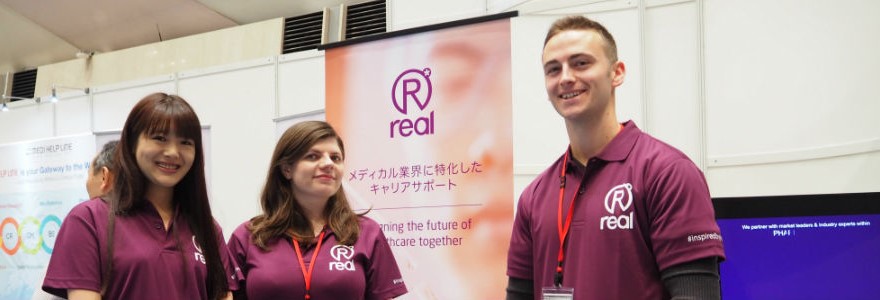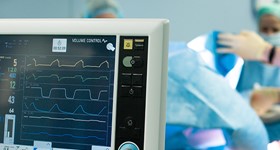Real Life Sciences Partners with DIA Japan Annual Meeting 2018

Real Life Sciences Japan is pleased to announce that we partnered with DIA Japan Annual Meeting 2018 held in Tokyo Big Sight on November 11th to 13th. DIA (Drug Information Association) is one of the largest communities of medical and clinical professionals with more than 10,000 members across 80 countries. Amongst the exhibitors were Syneos Health, famous CRO, ClinCloud, developer of pharmacovigilance systems, and IROM group, a provider of iPS cell reprogramming kit which uses virus vector.

Haruko Yamajo, manager of Real Life Sciences Japan stated “We are honoured to take part in such a great opportunity where world-leading professionals gathered to share their latest insights in the industry. We truly enjoyed our time in DIA where we were able to contribute to the community through our knowledge on talent strategies and the insights we get to share with other professionals.”
DIA focused on “Promoting Better Collaboration to Drive Global Health and Innovation in an Era of Medical and Scientific Transformation” this year and hosted active discussions amongst attendees. Professionals within drug development and life sciences were invited to speak and topics included a wide range of areas such as risks in drug development, pharmacovigilance, practical use of genomic medicine for cancer cure and reduction in drug review period by utilising AI. Experts shared their opinion about how technology can be leveraged within healthcare and assist in regulating its process.

The Future of Regulatory Affairs
Besides ensuring drug safety, handling antimicrobial resistance (AMR) and eliminating counterfeit drugs are two other major challenges within pharmaceutical regulations. To tackle these problems, global cooperation amongst regulatory authorities is essential. As such, members from the Innovation Project of ICMRA (International Coalition of Medicines Regulatory Authorities) discussed the latest trends of regulatory affairs in each country, as well as how it should look like in the coming years.
In the US, drugs developed by start-ups are becoming increasingly popular, more so than established pharma companies. Although the Japanese government may have initially fell behind in promoting start-ups initiated drug development, the country is now starting to look into investments within start-ups.
In addition, as the number of stakeholders engaged in the process of drug development increases, there will be a greater need to build a new regulatory framework by enhancing the global cooperation.
Use of Big Data in the Medical Field
The US government has taken the lead by spreading the importance and benefit of big data within the medical field by initiating the use of EHR (electronic health records) and PHR (personal health record). And in Japan, an Act for Authorized Providers of De-identified Health Data was enacted on May 11th, 2018. With this law, healthcare providers are able to obtain medical data under appropriate control. As such, Japanese pharmaceutical companies are also likely to follow this trend. DIA used this opportunity to hold an in-depth discussion on ways to leverage EHR and PHR, as well as how it impacts R&D and drug development in Japan.
However, there are also challenges with the implementation of big data in Japan. One of the biggest problems is the low number of electronic health records within hospitals in Japan. According to research operated by JAHIS in 2015, among 7,500 hospitals in Japan, only 38% have implemented electronic health record systems, while 97% in the UK and 69% in the US have done so as of 2012. Hence, the use of electronic health records need to be highly encouraged to ensure the effective use of big data in the next few years.
Hiring Trends within the Life Sciences Industry in Japan
Many professionals at DIA had expressed difficulty in finding talented experts for their organisation. With the growth of newly developed areas such as bio-pharmaceutical and genomic medication, talent with the relevant expertise and experience are in high demand. In addition to this, many established Japanese pharma companies still have a strong culture that prioritises in hiring new graduates. Therefore, they tend to lack internal systems and know-hows in successfully recruiting experienced candidates.
In light of this, DIA offered several talks on progressing one’s career and undertaking leadership in the industry which attracted many attendees. For the Japanese medical industry to continue growing, technological advancement alongside innovation as well as strategic recruiting will all be equally important.
To overcome the shortage of talent in Japan, Real Life Sciences is able to offer customised recruiting solutions to organisations with the global network we have across 15 countries and one of the world’s biggest candidate database in the industry. If you’d like to find out more about the talent we have or is part of the industry and would like to get connected with other professionals, please get in touch with us at contactjapan@realstaffing.com for more updates. You may also visit our website or LinkedIn page for more industry related insights.
Among the topics covered at DIA, below will be featured in the future articles. Please keep updated if you are interested.
• Are we taking enough advantage of vaccine?
• How to fight with Antimicrobial resistance (AMR)
• Are orphan drugs missed out from drug development?




